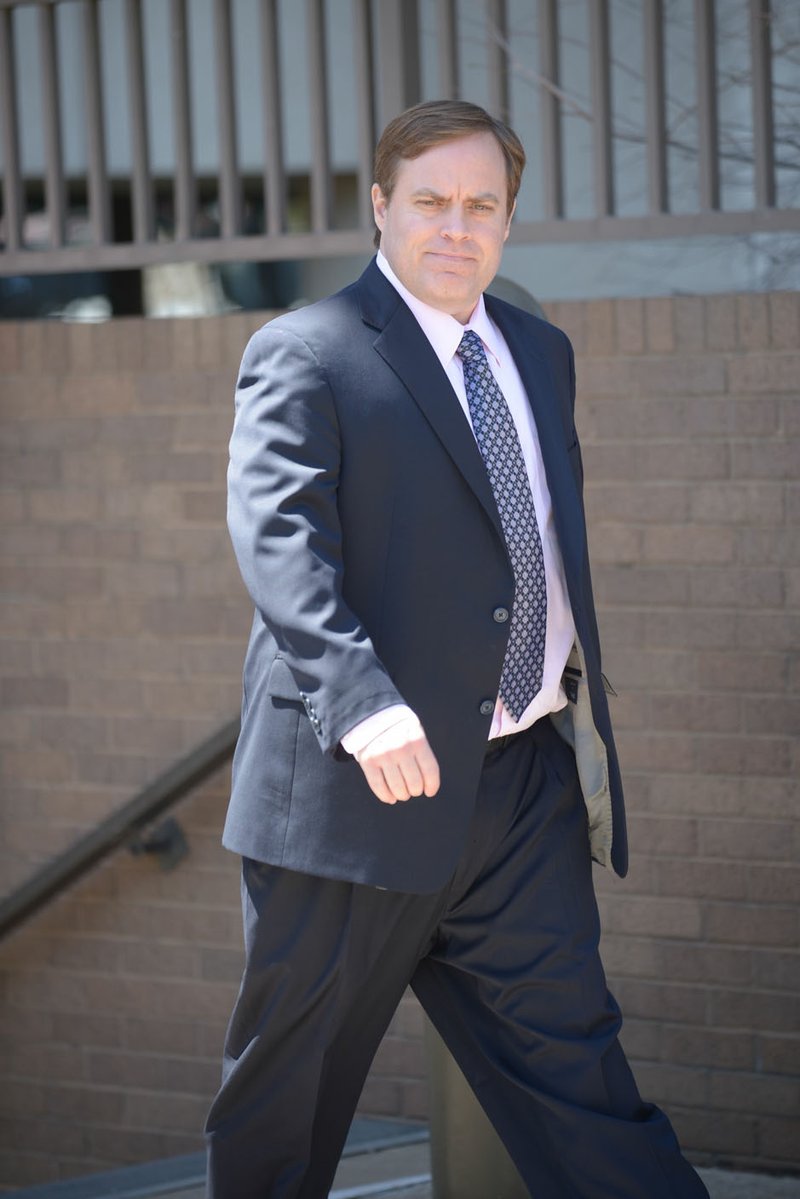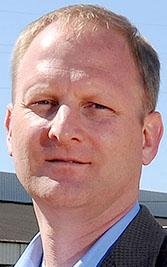FAYETTEVILLE — Two key players in the corruption case against former state Sen. Jon Woods took the witness stand for the defense Friday, but neither had much to say.
The judge restricted what attorneys could ask the first one, the FBI’s first lead investigator in the case. The second, a co-defendant who plead guilty five days before the trial began, asserted his constitutional right against self-incrimination.
Woods’ defense closed its case Friday without calling any new witnesses, catching his remaining co-defendant’s legal team off-guard. Woods didn’t take the stand in his defense.
Randall Shelton Jr.’s attorneys put on their only available witnesses Friday. One was Robert Cessario, the lead FBI agent whose misconduct barred him from testifying for the government. Next came Oren Paris III, the co-defendant who pleaded guilty. Two character witnesses, Little Rock businessman William Stover and Sue Shelton, the defendant’s mother, also testified.
Woods was indicted in March 2017, accused of a kickback scheme involving state General Improvement Fund grants issued in 2013 and 2014. Two alleged co-conspirators — Shelton, formerly of Alma, and Paris, former president of Ecclesia College in Springdale — were indicted with Woods.
“Your honor, I found out about this at 9:40 last night,” Chad Atwell, a defense attorney for Shelton, said about Woods’ decision to rest his case. U.S. District Judge Timothy L. Brooks had demanded to know why Atwell and his co-counsel didn’t have enough witnesses present to proceed throughout the rest of the afternoon. The court recessed before 2 p.m. and will resume Monday.
Patrick Benca of Little Rock, lead defense attorney for Woods, had told Brooks on Thursday he had two more witnesses and one wouldn’t be available to testify before Monday. Benca then sent an email Thursday night, according to attorney’s statements in court, announcing Woods’ defense intended to rest its case after finishing the testimony of Elizabeth Newlun, who had taken the stand late Thursday.
The change prompted an 8 a.m. hearing Friday before the jury was brought in. Brooks called Woods to the bench and queried him on whether he understood and agreed with the decision to rest the case. Woods said he did. Benca declined comment after the hearing on what prompted the strategy change.
Most of Shelton’s witnesses aren’t due to arrive until Monday morning based upon previous plans, his lawyers told the judge. Most of those witnesses are from Texas and one is from Mobile, Ala. Shelton moved back to his family’s ranch in Kemp, Texas, southeast of Dallas after his indictment.
Brooks demanded to know what witnesses Shelton could put on the stand Friday. Atwell replied the two character witness and Cessario were available. Shelton’s defense was still negotiating with Paris’ attorney, Travis Story, about whether Paris would testify.
Brooks told Atwell and Benca to finish testimony with Newlun. Then Woods’ defense would formally announce it was resting. Shelton could call his witnesses including Cessario. Then the court would break for lunch while Shelton’s defense made every effort to round up any witnesses they could including Paris, Brooks ordered.
First, though, Brooks held a hearing on what Cessario could and couldn’t be asked.
Assistant U.S. Attorney Aaron Jennen protested Cessario would have no value as a witness other than to draw attention to the fact he’s no longer on the investigation.
Cessario is no longer on the investigation team because he wiped the memory of a laptop computer twice in December after he was told to turn it over for inspection in an evidence dispute.
Atwell argued Friday his client’s defense is based on their contention the government’s investigation was inadequate. The former lead investigator is the appropriate person to ask why the government, for instance, didn’t subpoena his client’s personal bank records or take other actions. That required Cessario’s testimony, Atwell said.
“There are issues in this other than the elephant in the room,” Atwell said.
Brooks allowed Cessario to testify about what measures the investigation took, what measures it didn’t take and why it only took the measures that it did. Brooks wouldn’t allow questions about the laptop.
Newlun, administrative assistant to the president at Ecclesia, acknowledged Friday morning she is the fourth-highest paid employee at the school. The government contends Newlun was hired as a favor to Woods as part of the kickback scheme, which she denied in her testimony.
She said she was present when Cessario interviewed Paris once, that Cessario picked up a picture of Paris’ family, asked if those were Paris’ kids and if Paris had “ever been to prison.”
Newlun’s son, who served in the Air Force, was killed in action in 2011. He was a close childhood friend of Woods. The position at Ecclesia was just Woods helping out a close friend’s mother, defense attorneys said.
Cessario took the stand about 11 a.m. and finished testifying in less than 30 minutes. Both Atwell and Benca put questions to him. Cessario testified the investigation began sometime in 2014, that he didn’t recall if Shelton’s personal bank records were subpoenaed and that investigator’s time and resources are limited. The government had no questions. Cessario was excused from the trial at the end of his testimony, meaning he will not be recalled for this trial.
After a lunch recess, the defense told Brooks that Paris would exercise his Fifth Amendment right against self-incrimination if called to testify. Brooks said he understood but the court needed to take testimony on that and would bring Paris in after the jury left the courtroom.
Paris pleaded guilty April 4 to one count of conspiracy and agreed to testify for the government. He was not called before the government rested its case Wednesday. The government will have two witnesses for rebuttal after Shelton’s defense rests, Assistant U.S. Attorney Kenneth Elser told Brooks. Neither is Paris.
Paris resigned as Ecclesia’s president and from the private, Christian college’s board before his plea. His sentence is pending. Paris disguised the kickbacks as consulting fees paid to Shelton’s company, Paradigm Strategic Consulting, according to the indictment. Shelton then passed the money along to Woods and former state Rep. Micah Neal of Springdale, the government contends.
Paris was brought in after the jury was dismissed for a recess. Paris asserted his Fifth Amendment right on the second question from Atwell: What his occupation was. The first question was his name.
The kickback allegations involve $550,000 of the more than $717,500 in state General Improvement Fund grants Ecclesia received from 2013 through 2014, the U.S. Department of Justice contends.
Woods directed the most grant money Ecclesia received at more than $350,000, court records show.
Neal of Springdale pleaded guilty Jan. 4, 2017, for his role in the scheme and was the government’s first witness in the case. His sentence is also pending.
The trial of Woods and Shelton began April 9 in federal court in Fayetteville and is expected to end next week.
Woods directed a $200,000 grant to Ecclesia in September 2013, grant records show. Neal supported a $50,000 grant to the college and Woods another $150,000 in December 2014, also according to grant records. The amount of money Woods is accused of receiving as a kickback isn’t specified in the indictment. It claims much of that money was paid in cash, except for the $40,000 wire transfer from Shelton.
That Oct. 1, 2013, wire transfer was a loan, Shelton’s defense contends.
Woods faces 15 counts of fraud, all relating to either wire or mail transfers of money. Paris and Shelton were named in 14 of the fraud charges. All three were charged with one count of conspiracy to commit fraud. Woods is also charged with one count of money laundering in connection with the purchase of a cashier’s check.
Woods and Shelton face up to 20 years in prison on the fraud and conspiracy charges, if convicted. Woods faces an additional 10 years on the money-laundering charge, if convicted.
Woods and Neal also directed $400,000 in grant money to AmeriWorks, court and state records show. Neal said he received $20,000 delivered by Woods for steering $125,000 to AmeriWorks. Grant records show Woods directed $275,000 to the company.
AmeriWorks was incorporated by lobbyist Russell “Rusty” Cranford and described in a grant application as a work-training program. Cranford, 56, is set for trial June 11 in federal court in Springfield, Mo., on one count of conspiracy and eight counts of accepting bribes in an unrelated indictment.




